CBT and Existential Therapy: A Comparative Analysis
VerifiedAdded on 2023/06/14
|9
|2694
|302
AI Summary
This article provides a comparative analysis of Cognitive Behavioural Therapy (CBT) and Existential Therapy. It discusses the concept, significance, and pros and cons of both therapies. It also includes three waves of CBT and their effectiveness in treating mental health issues.
Contribute Materials
Your contribution can guide someone’s learning journey. Share your
documents today.
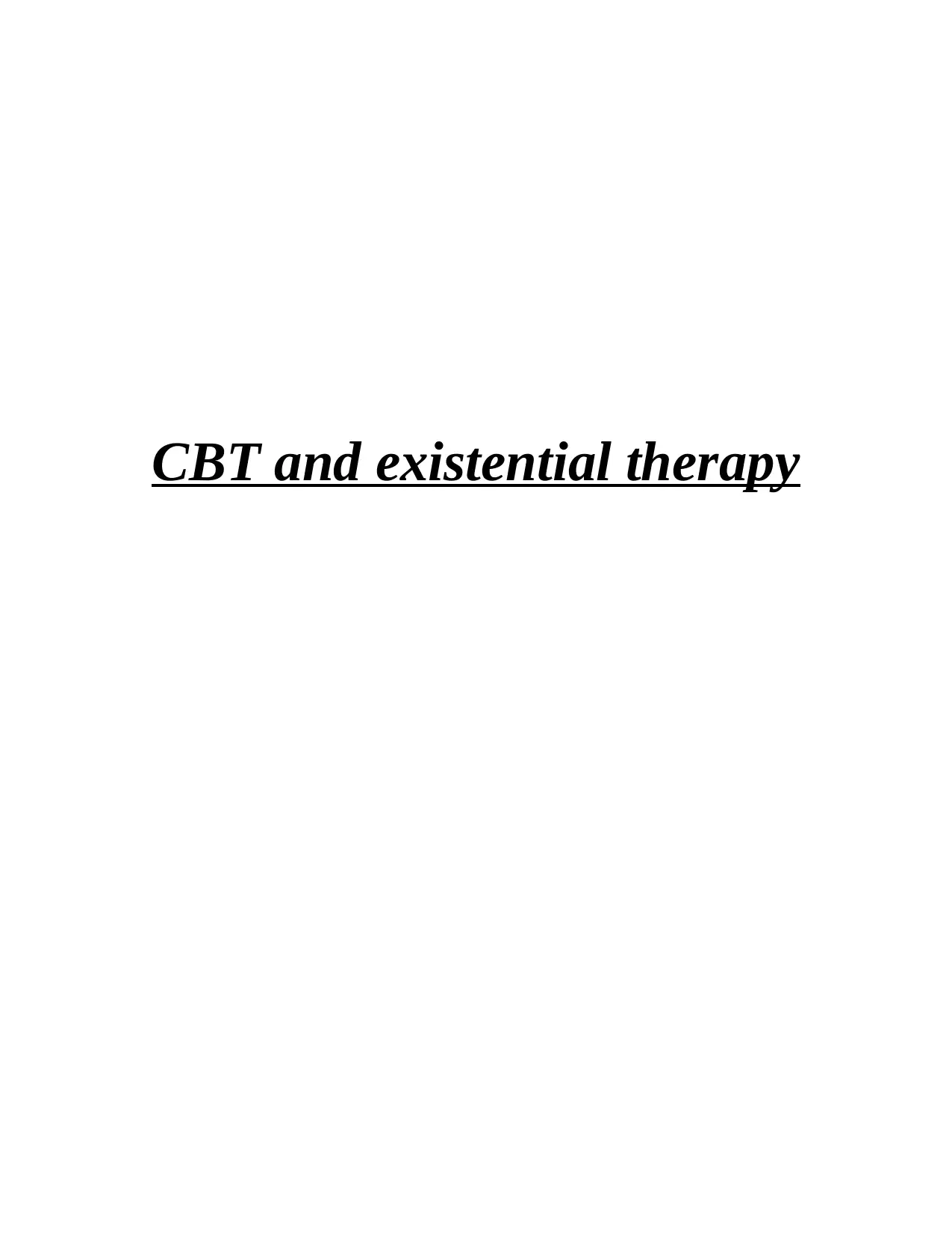
CBT and existential therapy
Secure Best Marks with AI Grader
Need help grading? Try our AI Grader for instant feedback on your assignments.
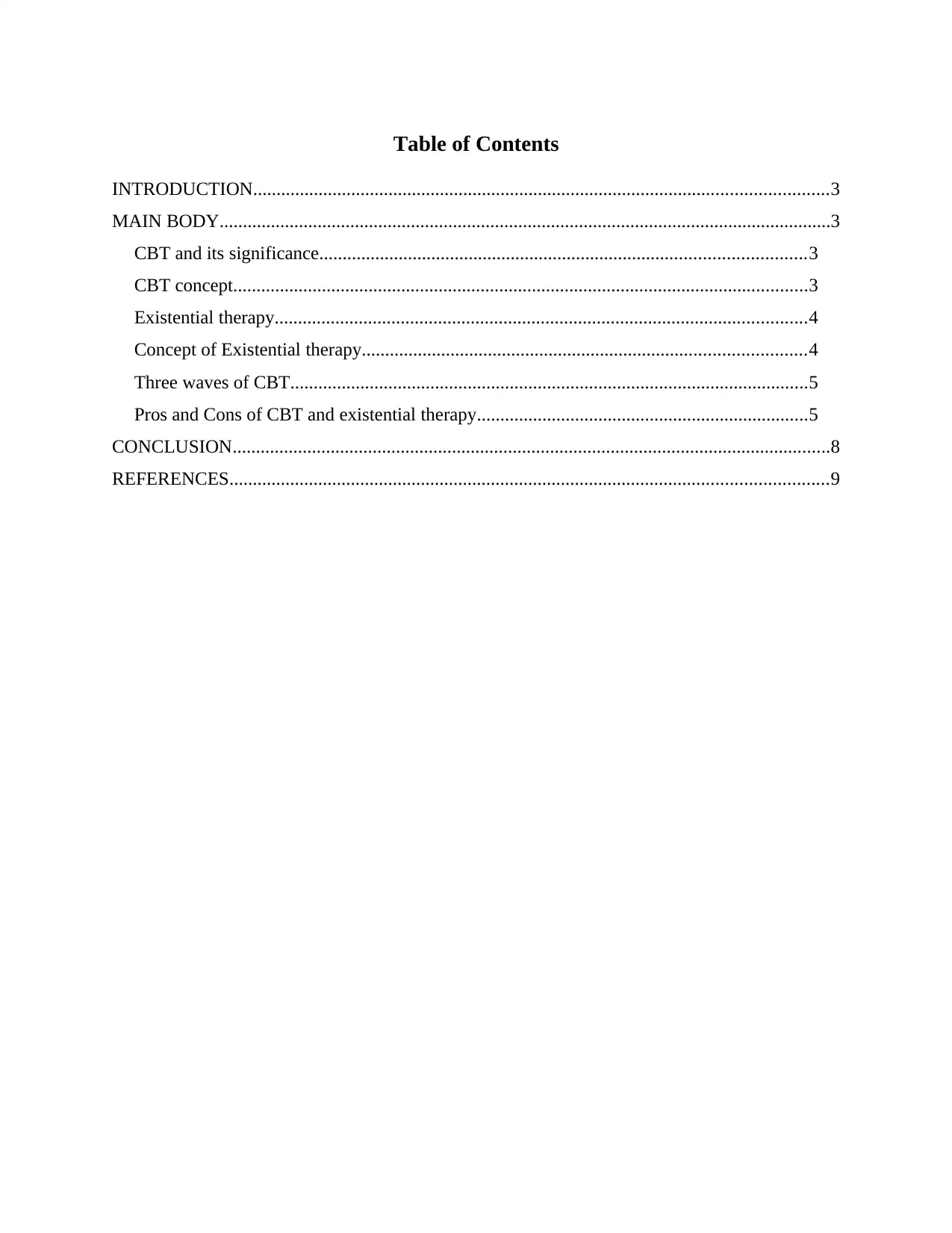
Table of Contents
INTRODUCTION...........................................................................................................................3
MAIN BODY...................................................................................................................................3
CBT and its significance........................................................................................................3
CBT concept...........................................................................................................................3
Existential therapy..................................................................................................................4
Concept of Existential therapy...............................................................................................4
Three waves of CBT...............................................................................................................5
Pros and Cons of CBT and existential therapy.......................................................................5
CONCLUSION................................................................................................................................8
REFERENCES................................................................................................................................9
INTRODUCTION...........................................................................................................................3
MAIN BODY...................................................................................................................................3
CBT and its significance........................................................................................................3
CBT concept...........................................................................................................................3
Existential therapy..................................................................................................................4
Concept of Existential therapy...............................................................................................4
Three waves of CBT...............................................................................................................5
Pros and Cons of CBT and existential therapy.......................................................................5
CONCLUSION................................................................................................................................8
REFERENCES................................................................................................................................9
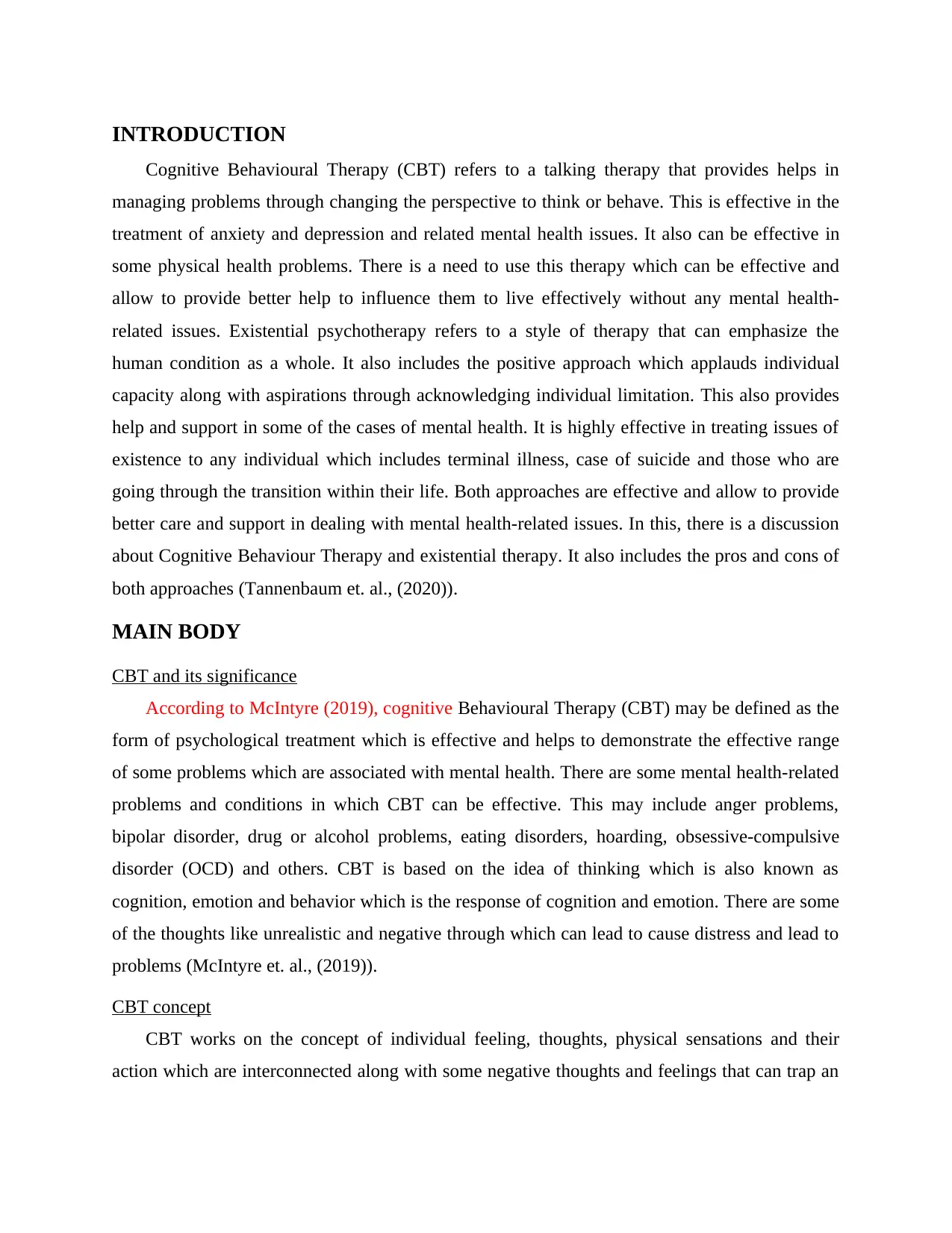
INTRODUCTION
Cognitive Behavioural Therapy (CBT) refers to a talking therapy that provides helps in
managing problems through changing the perspective to think or behave. This is effective in the
treatment of anxiety and depression and related mental health issues. It also can be effective in
some physical health problems. There is a need to use this therapy which can be effective and
allow to provide better help to influence them to live effectively without any mental health-
related issues. Existential psychotherapy refers to a style of therapy that can emphasize the
human condition as a whole. It also includes the positive approach which applauds individual
capacity along with aspirations through acknowledging individual limitation. This also provides
help and support in some of the cases of mental health. It is highly effective in treating issues of
existence to any individual which includes terminal illness, case of suicide and those who are
going through the transition within their life. Both approaches are effective and allow to provide
better care and support in dealing with mental health-related issues. In this, there is a discussion
about Cognitive Behaviour Therapy and existential therapy. It also includes the pros and cons of
both approaches (Tannenbaum et. al., (2020)).
MAIN BODY
CBT and its significance
According to McIntyre (2019), cognitive Behavioural Therapy (CBT) may be defined as the
form of psychological treatment which is effective and helps to demonstrate the effective range
of some problems which are associated with mental health. There are some mental health-related
problems and conditions in which CBT can be effective. This may include anger problems,
bipolar disorder, drug or alcohol problems, eating disorders, hoarding, obsessive-compulsive
disorder (OCD) and others. CBT is based on the idea of thinking which is also known as
cognition, emotion and behavior which is the response of cognition and emotion. There are some
of the thoughts like unrealistic and negative through which can lead to cause distress and lead to
problems (McIntyre et. al., (2019)).
CBT concept
CBT works on the concept of individual feeling, thoughts, physical sensations and their
action which are interconnected along with some negative thoughts and feelings that can trap an
Cognitive Behavioural Therapy (CBT) refers to a talking therapy that provides helps in
managing problems through changing the perspective to think or behave. This is effective in the
treatment of anxiety and depression and related mental health issues. It also can be effective in
some physical health problems. There is a need to use this therapy which can be effective and
allow to provide better help to influence them to live effectively without any mental health-
related issues. Existential psychotherapy refers to a style of therapy that can emphasize the
human condition as a whole. It also includes the positive approach which applauds individual
capacity along with aspirations through acknowledging individual limitation. This also provides
help and support in some of the cases of mental health. It is highly effective in treating issues of
existence to any individual which includes terminal illness, case of suicide and those who are
going through the transition within their life. Both approaches are effective and allow to provide
better care and support in dealing with mental health-related issues. In this, there is a discussion
about Cognitive Behaviour Therapy and existential therapy. It also includes the pros and cons of
both approaches (Tannenbaum et. al., (2020)).
MAIN BODY
CBT and its significance
According to McIntyre (2019), cognitive Behavioural Therapy (CBT) may be defined as the
form of psychological treatment which is effective and helps to demonstrate the effective range
of some problems which are associated with mental health. There are some mental health-related
problems and conditions in which CBT can be effective. This may include anger problems,
bipolar disorder, drug or alcohol problems, eating disorders, hoarding, obsessive-compulsive
disorder (OCD) and others. CBT is based on the idea of thinking which is also known as
cognition, emotion and behavior which is the response of cognition and emotion. There are some
of the thoughts like unrealistic and negative through which can lead to cause distress and lead to
problems (McIntyre et. al., (2019)).
CBT concept
CBT works on the concept of individual feeling, thoughts, physical sensations and their
action which are interconnected along with some negative thoughts and feelings that can trap an
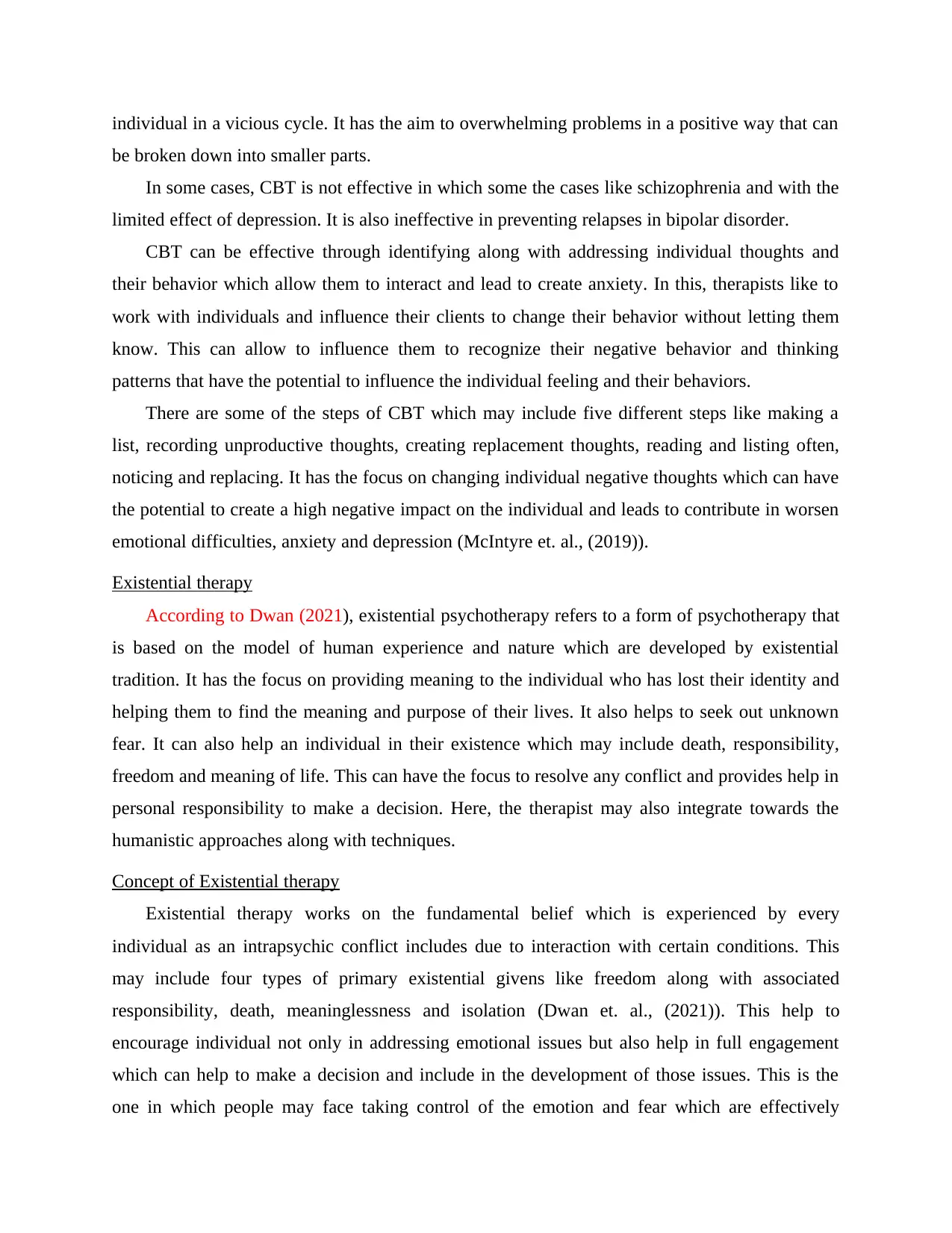
individual in a vicious cycle. It has the aim to overwhelming problems in a positive way that can
be broken down into smaller parts.
In some cases, CBT is not effective in which some the cases like schizophrenia and with the
limited effect of depression. It is also ineffective in preventing relapses in bipolar disorder.
CBT can be effective through identifying along with addressing individual thoughts and
their behavior which allow them to interact and lead to create anxiety. In this, therapists like to
work with individuals and influence their clients to change their behavior without letting them
know. This can allow to influence them to recognize their negative behavior and thinking
patterns that have the potential to influence the individual feeling and their behaviors.
There are some of the steps of CBT which may include five different steps like making a
list, recording unproductive thoughts, creating replacement thoughts, reading and listing often,
noticing and replacing. It has the focus on changing individual negative thoughts which can have
the potential to create a high negative impact on the individual and leads to contribute in worsen
emotional difficulties, anxiety and depression (McIntyre et. al., (2019)).
Existential therapy
According to Dwan (2021), existential psychotherapy refers to a form of psychotherapy that
is based on the model of human experience and nature which are developed by existential
tradition. It has the focus on providing meaning to the individual who has lost their identity and
helping them to find the meaning and purpose of their lives. It also helps to seek out unknown
fear. It can also help an individual in their existence which may include death, responsibility,
freedom and meaning of life. This can have the focus to resolve any conflict and provides help in
personal responsibility to make a decision. Here, the therapist may also integrate towards the
humanistic approaches along with techniques.
Concept of Existential therapy
Existential therapy works on the fundamental belief which is experienced by every
individual as an intrapsychic conflict includes due to interaction with certain conditions. This
may include four types of primary existential givens like freedom along with associated
responsibility, death, meaninglessness and isolation (Dwan et. al., (2021)). This help to
encourage individual not only in addressing emotional issues but also help in full engagement
which can help to make a decision and include in the development of those issues. This is the
one in which people may face taking control of the emotion and fear which are effectively
be broken down into smaller parts.
In some cases, CBT is not effective in which some the cases like schizophrenia and with the
limited effect of depression. It is also ineffective in preventing relapses in bipolar disorder.
CBT can be effective through identifying along with addressing individual thoughts and
their behavior which allow them to interact and lead to create anxiety. In this, therapists like to
work with individuals and influence their clients to change their behavior without letting them
know. This can allow to influence them to recognize their negative behavior and thinking
patterns that have the potential to influence the individual feeling and their behaviors.
There are some of the steps of CBT which may include five different steps like making a
list, recording unproductive thoughts, creating replacement thoughts, reading and listing often,
noticing and replacing. It has the focus on changing individual negative thoughts which can have
the potential to create a high negative impact on the individual and leads to contribute in worsen
emotional difficulties, anxiety and depression (McIntyre et. al., (2019)).
Existential therapy
According to Dwan (2021), existential psychotherapy refers to a form of psychotherapy that
is based on the model of human experience and nature which are developed by existential
tradition. It has the focus on providing meaning to the individual who has lost their identity and
helping them to find the meaning and purpose of their lives. It also helps to seek out unknown
fear. It can also help an individual in their existence which may include death, responsibility,
freedom and meaning of life. This can have the focus to resolve any conflict and provides help in
personal responsibility to make a decision. Here, the therapist may also integrate towards the
humanistic approaches along with techniques.
Concept of Existential therapy
Existential therapy works on the fundamental belief which is experienced by every
individual as an intrapsychic conflict includes due to interaction with certain conditions. This
may include four types of primary existential givens like freedom along with associated
responsibility, death, meaninglessness and isolation (Dwan et. al., (2021)). This help to
encourage individual not only in addressing emotional issues but also help in full engagement
which can help to make a decision and include in the development of those issues. This is the
one in which people may face taking control of the emotion and fear which are effectively
Secure Best Marks with AI Grader
Need help grading? Try our AI Grader for instant feedback on your assignments.
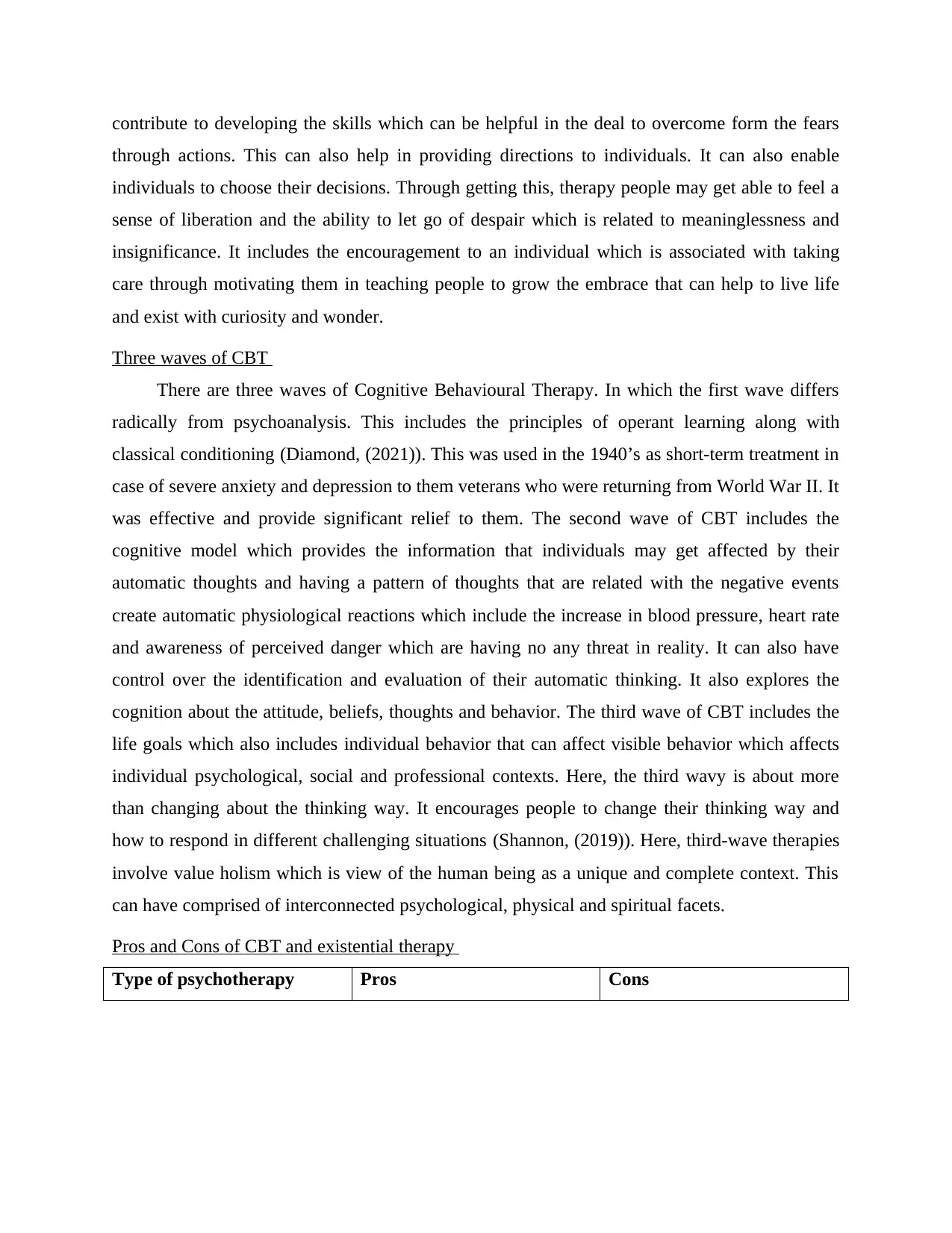
contribute to developing the skills which can be helpful in the deal to overcome form the fears
through actions. This can also help in providing directions to individuals. It can also enable
individuals to choose their decisions. Through getting this, therapy people may get able to feel a
sense of liberation and the ability to let go of despair which is related to meaninglessness and
insignificance. It includes the encouragement to an individual which is associated with taking
care through motivating them in teaching people to grow the embrace that can help to live life
and exist with curiosity and wonder.
Three waves of CBT
There are three waves of Cognitive Behavioural Therapy. In which the first wave differs
radically from psychoanalysis. This includes the principles of operant learning along with
classical conditioning (Diamond, (2021)). This was used in the 1940’s as short-term treatment in
case of severe anxiety and depression to them veterans who were returning from World War II. It
was effective and provide significant relief to them. The second wave of CBT includes the
cognitive model which provides the information that individuals may get affected by their
automatic thoughts and having a pattern of thoughts that are related with the negative events
create automatic physiological reactions which include the increase in blood pressure, heart rate
and awareness of perceived danger which are having no any threat in reality. It can also have
control over the identification and evaluation of their automatic thinking. It also explores the
cognition about the attitude, beliefs, thoughts and behavior. The third wave of CBT includes the
life goals which also includes individual behavior that can affect visible behavior which affects
individual psychological, social and professional contexts. Here, the third wavy is about more
than changing about the thinking way. It encourages people to change their thinking way and
how to respond in different challenging situations (Shannon, (2019)). Here, third-wave therapies
involve value holism which is view of the human being as a unique and complete context. This
can have comprised of interconnected psychological, physical and spiritual facets.
Pros and Cons of CBT and existential therapy
Type of psychotherapy Pros Cons
through actions. This can also help in providing directions to individuals. It can also enable
individuals to choose their decisions. Through getting this, therapy people may get able to feel a
sense of liberation and the ability to let go of despair which is related to meaninglessness and
insignificance. It includes the encouragement to an individual which is associated with taking
care through motivating them in teaching people to grow the embrace that can help to live life
and exist with curiosity and wonder.
Three waves of CBT
There are three waves of Cognitive Behavioural Therapy. In which the first wave differs
radically from psychoanalysis. This includes the principles of operant learning along with
classical conditioning (Diamond, (2021)). This was used in the 1940’s as short-term treatment in
case of severe anxiety and depression to them veterans who were returning from World War II. It
was effective and provide significant relief to them. The second wave of CBT includes the
cognitive model which provides the information that individuals may get affected by their
automatic thoughts and having a pattern of thoughts that are related with the negative events
create automatic physiological reactions which include the increase in blood pressure, heart rate
and awareness of perceived danger which are having no any threat in reality. It can also have
control over the identification and evaluation of their automatic thinking. It also explores the
cognition about the attitude, beliefs, thoughts and behavior. The third wave of CBT includes the
life goals which also includes individual behavior that can affect visible behavior which affects
individual psychological, social and professional contexts. Here, the third wavy is about more
than changing about the thinking way. It encourages people to change their thinking way and
how to respond in different challenging situations (Shannon, (2019)). Here, third-wave therapies
involve value holism which is view of the human being as a unique and complete context. This
can have comprised of interconnected psychological, physical and spiritual facets.
Pros and Cons of CBT and existential therapy
Type of psychotherapy Pros Cons
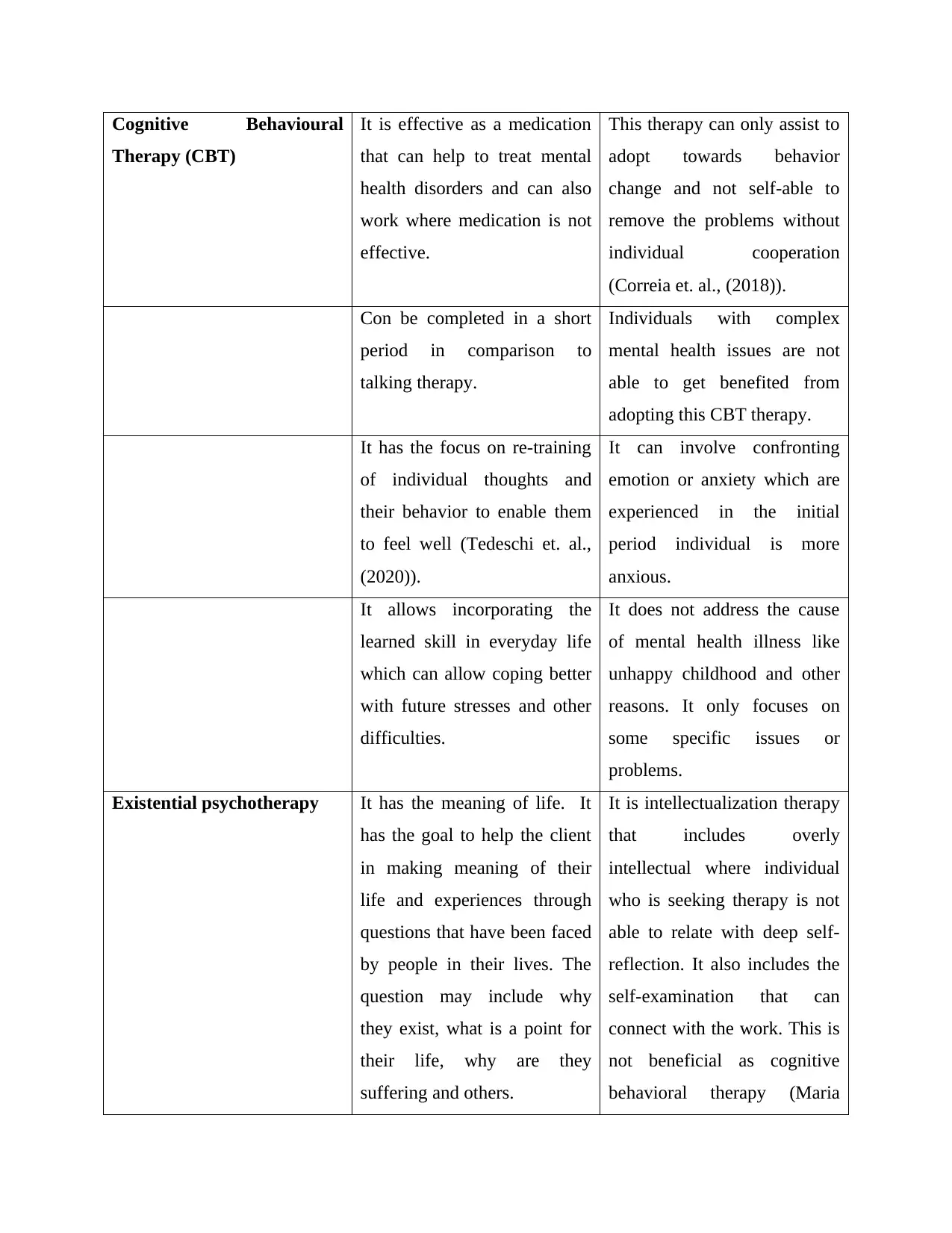
Cognitive Behavioural
Therapy (CBT)
It is effective as a medication
that can help to treat mental
health disorders and can also
work where medication is not
effective.
This therapy can only assist to
adopt towards behavior
change and not self-able to
remove the problems without
individual cooperation
(Correia et. al., (2018)).
Con be completed in a short
period in comparison to
talking therapy.
Individuals with complex
mental health issues are not
able to get benefited from
adopting this CBT therapy.
It has the focus on re-training
of individual thoughts and
their behavior to enable them
to feel well (Tedeschi et. al.,
(2020)).
It can involve confronting
emotion or anxiety which are
experienced in the initial
period individual is more
anxious.
It allows incorporating the
learned skill in everyday life
which can allow coping better
with future stresses and other
difficulties.
It does not address the cause
of mental health illness like
unhappy childhood and other
reasons. It only focuses on
some specific issues or
problems.
Existential psychotherapy It has the meaning of life. It
has the goal to help the client
in making meaning of their
life and experiences through
questions that have been faced
by people in their lives. The
question may include why
they exist, what is a point for
their life, why are they
suffering and others.
It is intellectualization therapy
that includes overly
intellectual where individual
who is seeking therapy is not
able to relate with deep self-
reflection. It also includes the
self-examination that can
connect with the work. This is
not beneficial as cognitive
behavioral therapy (Maria
Therapy (CBT)
It is effective as a medication
that can help to treat mental
health disorders and can also
work where medication is not
effective.
This therapy can only assist to
adopt towards behavior
change and not self-able to
remove the problems without
individual cooperation
(Correia et. al., (2018)).
Con be completed in a short
period in comparison to
talking therapy.
Individuals with complex
mental health issues are not
able to get benefited from
adopting this CBT therapy.
It has the focus on re-training
of individual thoughts and
their behavior to enable them
to feel well (Tedeschi et. al.,
(2020)).
It can involve confronting
emotion or anxiety which are
experienced in the initial
period individual is more
anxious.
It allows incorporating the
learned skill in everyday life
which can allow coping better
with future stresses and other
difficulties.
It does not address the cause
of mental health illness like
unhappy childhood and other
reasons. It only focuses on
some specific issues or
problems.
Existential psychotherapy It has the meaning of life. It
has the goal to help the client
in making meaning of their
life and experiences through
questions that have been faced
by people in their lives. The
question may include why
they exist, what is a point for
their life, why are they
suffering and others.
It is intellectualization therapy
that includes overly
intellectual where individual
who is seeking therapy is not
able to relate with deep self-
reflection. It also includes the
self-examination that can
connect with the work. This is
not beneficial as cognitive
behavioral therapy (Maria
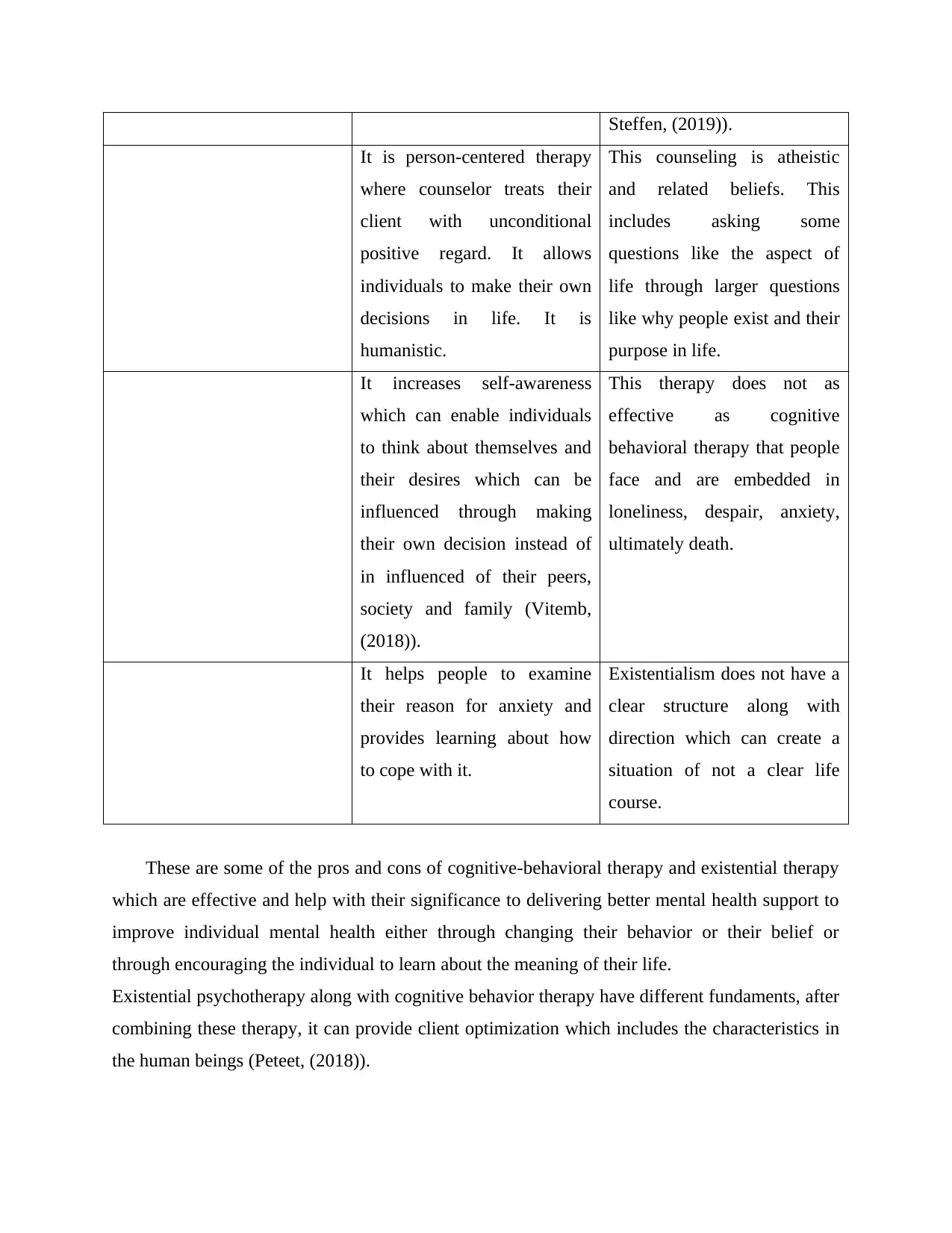
Steffen, (2019)).
It is person-centered therapy
where counselor treats their
client with unconditional
positive regard. It allows
individuals to make their own
decisions in life. It is
humanistic.
This counseling is atheistic
and related beliefs. This
includes asking some
questions like the aspect of
life through larger questions
like why people exist and their
purpose in life.
It increases self-awareness
which can enable individuals
to think about themselves and
their desires which can be
influenced through making
their own decision instead of
in influenced of their peers,
society and family (Vitemb,
(2018)).
This therapy does not as
effective as cognitive
behavioral therapy that people
face and are embedded in
loneliness, despair, anxiety,
ultimately death.
It helps people to examine
their reason for anxiety and
provides learning about how
to cope with it.
Existentialism does not have a
clear structure along with
direction which can create a
situation of not a clear life
course.
These are some of the pros and cons of cognitive-behavioral therapy and existential therapy
which are effective and help with their significance to delivering better mental health support to
improve individual mental health either through changing their behavior or their belief or
through encouraging the individual to learn about the meaning of their life.
Existential psychotherapy along with cognitive behavior therapy have different fundaments, after
combining these therapy, it can provide client optimization which includes the characteristics in
the human beings (Peteet, (2018)).
It is person-centered therapy
where counselor treats their
client with unconditional
positive regard. It allows
individuals to make their own
decisions in life. It is
humanistic.
This counseling is atheistic
and related beliefs. This
includes asking some
questions like the aspect of
life through larger questions
like why people exist and their
purpose in life.
It increases self-awareness
which can enable individuals
to think about themselves and
their desires which can be
influenced through making
their own decision instead of
in influenced of their peers,
society and family (Vitemb,
(2018)).
This therapy does not as
effective as cognitive
behavioral therapy that people
face and are embedded in
loneliness, despair, anxiety,
ultimately death.
It helps people to examine
their reason for anxiety and
provides learning about how
to cope with it.
Existentialism does not have a
clear structure along with
direction which can create a
situation of not a clear life
course.
These are some of the pros and cons of cognitive-behavioral therapy and existential therapy
which are effective and help with their significance to delivering better mental health support to
improve individual mental health either through changing their behavior or their belief or
through encouraging the individual to learn about the meaning of their life.
Existential psychotherapy along with cognitive behavior therapy have different fundaments, after
combining these therapy, it can provide client optimization which includes the characteristics in
the human beings (Peteet, (2018)).
Paraphrase This Document
Need a fresh take? Get an instant paraphrase of this document with our AI Paraphraser
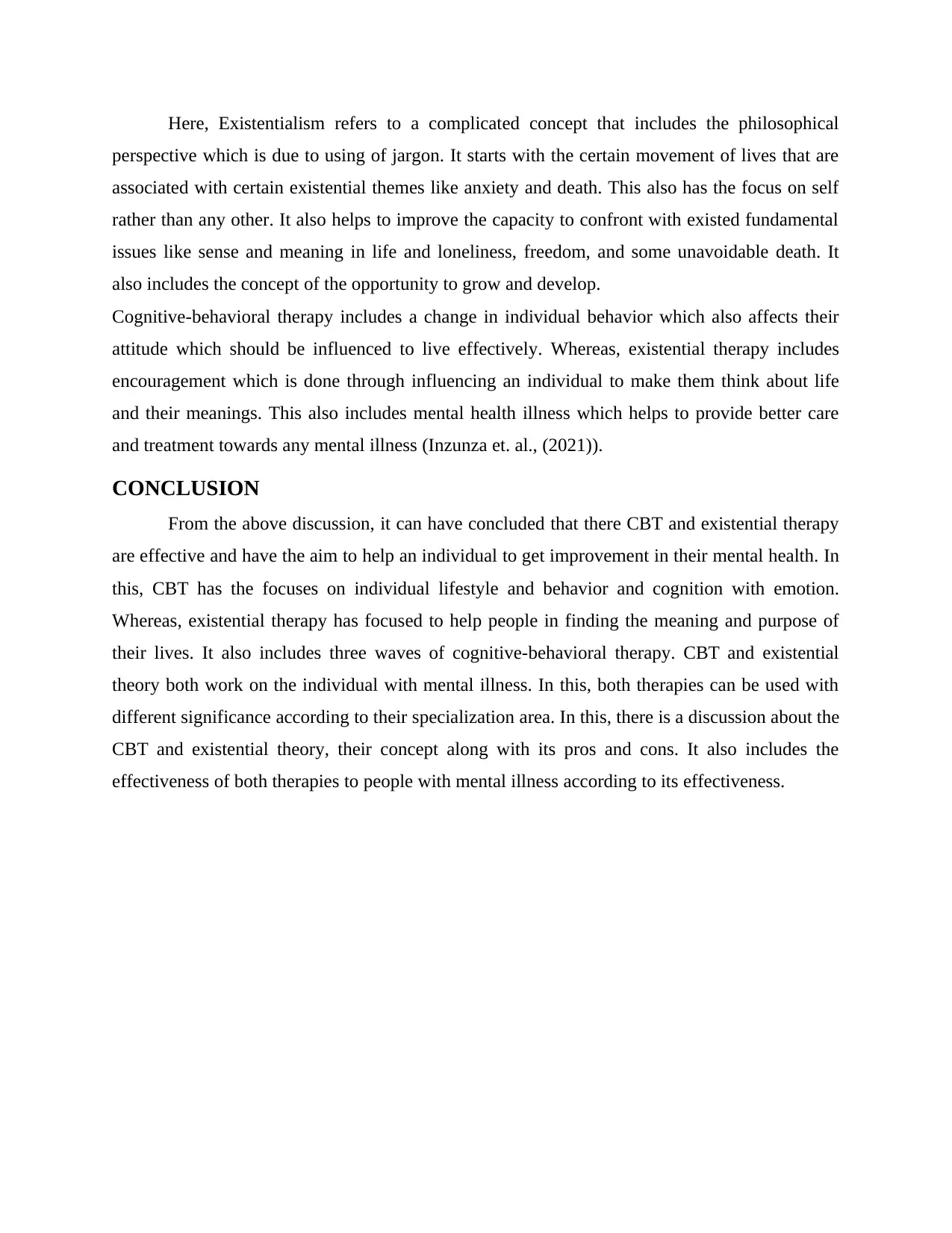
Here, Existentialism refers to a complicated concept that includes the philosophical
perspective which is due to using of jargon. It starts with the certain movement of lives that are
associated with certain existential themes like anxiety and death. This also has the focus on self
rather than any other. It also helps to improve the capacity to confront with existed fundamental
issues like sense and meaning in life and loneliness, freedom, and some unavoidable death. It
also includes the concept of the opportunity to grow and develop.
Cognitive-behavioral therapy includes a change in individual behavior which also affects their
attitude which should be influenced to live effectively. Whereas, existential therapy includes
encouragement which is done through influencing an individual to make them think about life
and their meanings. This also includes mental health illness which helps to provide better care
and treatment towards any mental illness (Inzunza et. al., (2021)).
CONCLUSION
From the above discussion, it can have concluded that there CBT and existential therapy
are effective and have the aim to help an individual to get improvement in their mental health. In
this, CBT has the focuses on individual lifestyle and behavior and cognition with emotion.
Whereas, existential therapy has focused to help people in finding the meaning and purpose of
their lives. It also includes three waves of cognitive-behavioral therapy. CBT and existential
theory both work on the individual with mental illness. In this, both therapies can be used with
different significance according to their specialization area. In this, there is a discussion about the
CBT and existential theory, their concept along with its pros and cons. It also includes the
effectiveness of both therapies to people with mental illness according to its effectiveness.
perspective which is due to using of jargon. It starts with the certain movement of lives that are
associated with certain existential themes like anxiety and death. This also has the focus on self
rather than any other. It also helps to improve the capacity to confront with existed fundamental
issues like sense and meaning in life and loneliness, freedom, and some unavoidable death. It
also includes the concept of the opportunity to grow and develop.
Cognitive-behavioral therapy includes a change in individual behavior which also affects their
attitude which should be influenced to live effectively. Whereas, existential therapy includes
encouragement which is done through influencing an individual to make them think about life
and their meanings. This also includes mental health illness which helps to provide better care
and treatment towards any mental illness (Inzunza et. al., (2021)).
CONCLUSION
From the above discussion, it can have concluded that there CBT and existential therapy
are effective and have the aim to help an individual to get improvement in their mental health. In
this, CBT has the focuses on individual lifestyle and behavior and cognition with emotion.
Whereas, existential therapy has focused to help people in finding the meaning and purpose of
their lives. It also includes three waves of cognitive-behavioral therapy. CBT and existential
theory both work on the individual with mental illness. In this, both therapies can be used with
different significance according to their specialization area. In this, there is a discussion about the
CBT and existential theory, their concept along with its pros and cons. It also includes the
effectiveness of both therapies to people with mental illness according to its effectiveness.
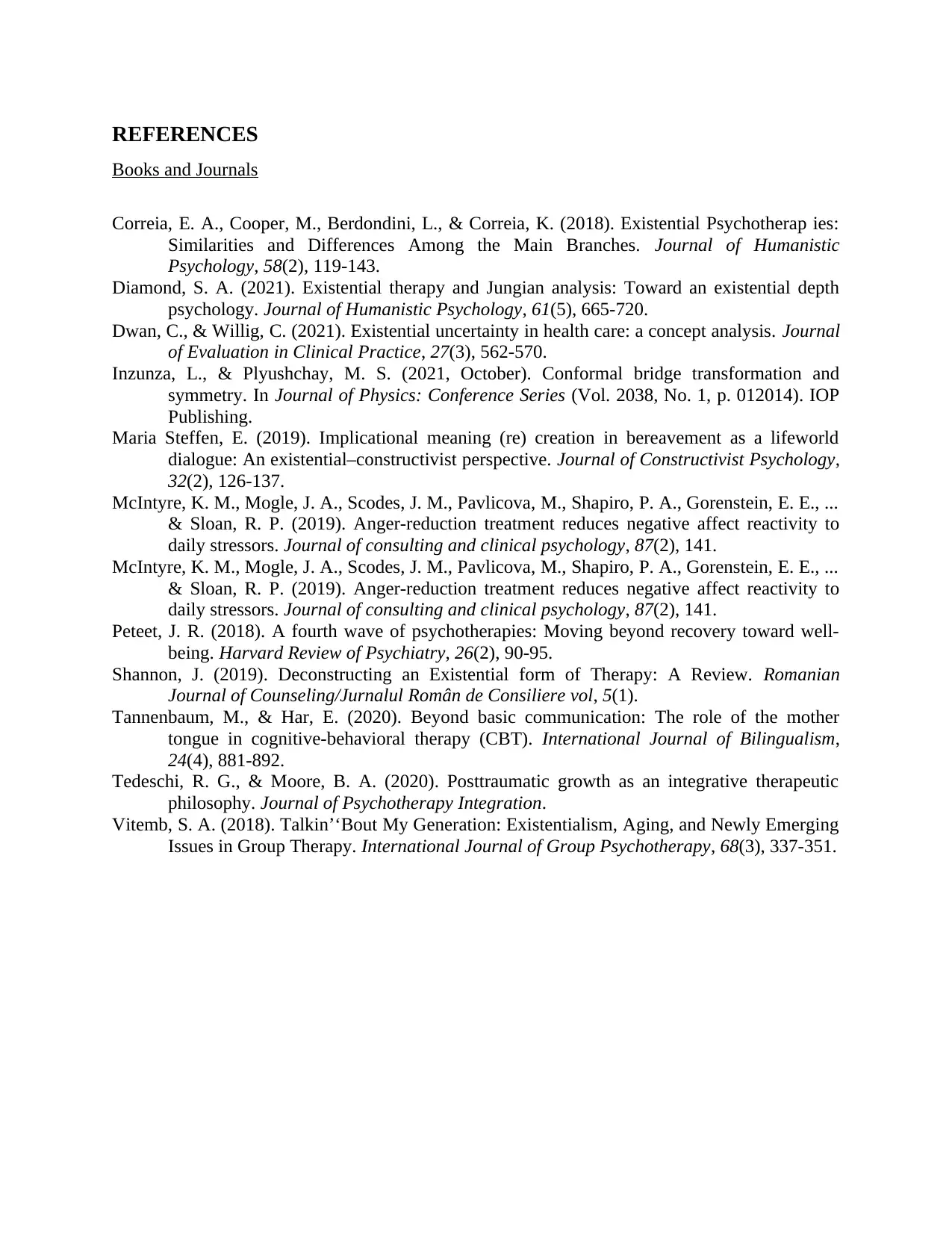
REFERENCES
Books and Journals
Correia, E. A., Cooper, M., Berdondini, L., & Correia, K. (2018). Existential Psychotherap ies:
Similarities and Differences Among the Main Branches. Journal of Humanistic
Psychology, 58(2), 119-143.
Diamond, S. A. (2021). Existential therapy and Jungian analysis: Toward an existential depth
psychology. Journal of Humanistic Psychology, 61(5), 665-720.
Dwan, C., & Willig, C. (2021). Existential uncertainty in health care: a concept analysis. Journal
of Evaluation in Clinical Practice, 27(3), 562-570.
Inzunza, L., & Plyushchay, M. S. (2021, October). Conformal bridge transformation and
symmetry. In Journal of Physics: Conference Series (Vol. 2038, No. 1, p. 012014). IOP
Publishing.
Maria Steffen, E. (2019). Implicational meaning (re) creation in bereavement as a lifeworld
dialogue: An existential–constructivist perspective. Journal of Constructivist Psychology,
32(2), 126-137.
McIntyre, K. M., Mogle, J. A., Scodes, J. M., Pavlicova, M., Shapiro, P. A., Gorenstein, E. E., ...
& Sloan, R. P. (2019). Anger-reduction treatment reduces negative affect reactivity to
daily stressors. Journal of consulting and clinical psychology, 87(2), 141.
McIntyre, K. M., Mogle, J. A., Scodes, J. M., Pavlicova, M., Shapiro, P. A., Gorenstein, E. E., ...
& Sloan, R. P. (2019). Anger-reduction treatment reduces negative affect reactivity to
daily stressors. Journal of consulting and clinical psychology, 87(2), 141.
Peteet, J. R. (2018). A fourth wave of psychotherapies: Moving beyond recovery toward well-
being. Harvard Review of Psychiatry, 26(2), 90-95.
Shannon, J. (2019). Deconstructing an Existential form of Therapy: A Review. Romanian
Journal of Counseling/Jurnalul Român de Consiliere vol, 5(1).
Tannenbaum, M., & Har, E. (2020). Beyond basic communication: The role of the mother
tongue in cognitive-behavioral therapy (CBT). International Journal of Bilingualism,
24(4), 881-892.
Tedeschi, R. G., & Moore, B. A. (2020). Posttraumatic growth as an integrative therapeutic
philosophy. Journal of Psychotherapy Integration.
Vitemb, S. A. (2018). Talkin’‘Bout My Generation: Existentialism, Aging, and Newly Emerging
Issues in Group Therapy. International Journal of Group Psychotherapy, 68(3), 337-351.
Books and Journals
Correia, E. A., Cooper, M., Berdondini, L., & Correia, K. (2018). Existential Psychotherap ies:
Similarities and Differences Among the Main Branches. Journal of Humanistic
Psychology, 58(2), 119-143.
Diamond, S. A. (2021). Existential therapy and Jungian analysis: Toward an existential depth
psychology. Journal of Humanistic Psychology, 61(5), 665-720.
Dwan, C., & Willig, C. (2021). Existential uncertainty in health care: a concept analysis. Journal
of Evaluation in Clinical Practice, 27(3), 562-570.
Inzunza, L., & Plyushchay, M. S. (2021, October). Conformal bridge transformation and
symmetry. In Journal of Physics: Conference Series (Vol. 2038, No. 1, p. 012014). IOP
Publishing.
Maria Steffen, E. (2019). Implicational meaning (re) creation in bereavement as a lifeworld
dialogue: An existential–constructivist perspective. Journal of Constructivist Psychology,
32(2), 126-137.
McIntyre, K. M., Mogle, J. A., Scodes, J. M., Pavlicova, M., Shapiro, P. A., Gorenstein, E. E., ...
& Sloan, R. P. (2019). Anger-reduction treatment reduces negative affect reactivity to
daily stressors. Journal of consulting and clinical psychology, 87(2), 141.
McIntyre, K. M., Mogle, J. A., Scodes, J. M., Pavlicova, M., Shapiro, P. A., Gorenstein, E. E., ...
& Sloan, R. P. (2019). Anger-reduction treatment reduces negative affect reactivity to
daily stressors. Journal of consulting and clinical psychology, 87(2), 141.
Peteet, J. R. (2018). A fourth wave of psychotherapies: Moving beyond recovery toward well-
being. Harvard Review of Psychiatry, 26(2), 90-95.
Shannon, J. (2019). Deconstructing an Existential form of Therapy: A Review. Romanian
Journal of Counseling/Jurnalul Român de Consiliere vol, 5(1).
Tannenbaum, M., & Har, E. (2020). Beyond basic communication: The role of the mother
tongue in cognitive-behavioral therapy (CBT). International Journal of Bilingualism,
24(4), 881-892.
Tedeschi, R. G., & Moore, B. A. (2020). Posttraumatic growth as an integrative therapeutic
philosophy. Journal of Psychotherapy Integration.
Vitemb, S. A. (2018). Talkin’‘Bout My Generation: Existentialism, Aging, and Newly Emerging
Issues in Group Therapy. International Journal of Group Psychotherapy, 68(3), 337-351.
1 out of 9
Related Documents
Your All-in-One AI-Powered Toolkit for Academic Success.
+13062052269
info@desklib.com
Available 24*7 on WhatsApp / Email
![[object Object]](/_next/static/media/star-bottom.7253800d.svg)
Unlock your academic potential
© 2024 | Zucol Services PVT LTD | All rights reserved.




